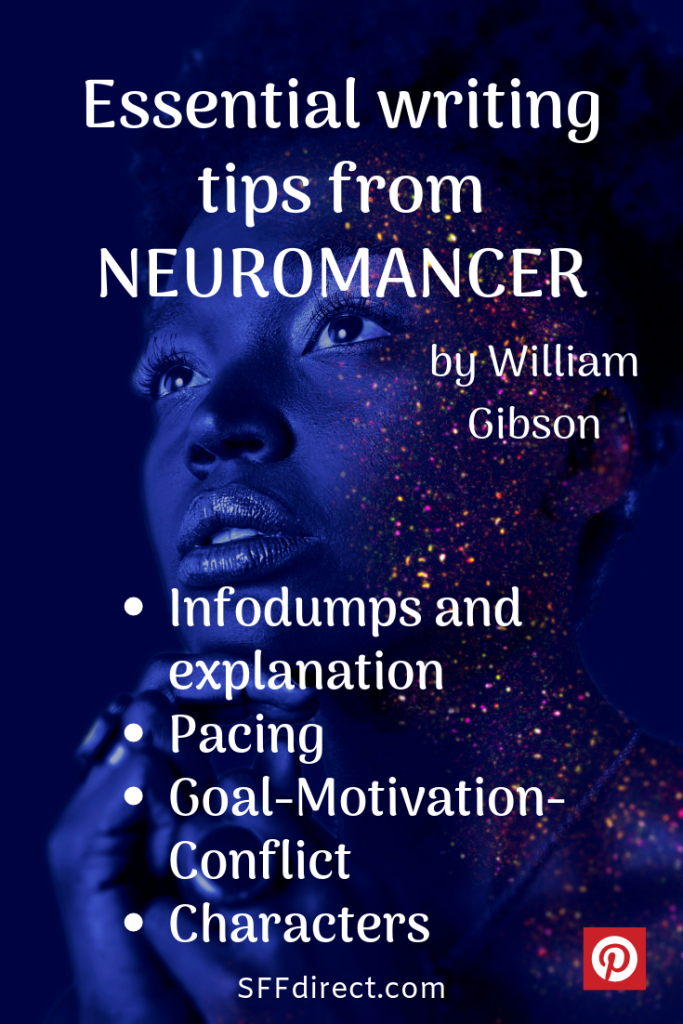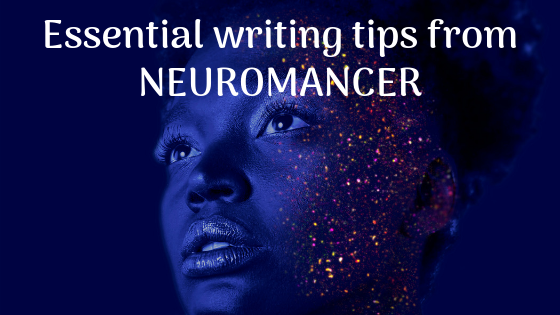I have just finished reading Neuromancer by William Gibson. It was on my reading list for a long time so I’m pleased I’ve finally read it. While I was reading, several matters struck me to do with how the book is written. In this article I describe them and give some writing tips.
I’ll start with a brief description of the novel for those not familiar with it. Neuromancer was written in 1984 and it is considered a classic work of science fiction, a seminal work in fact. It describes a future world dominated by technology and it kickstarted the science fiction sub-genre called cyberpunk.
I recommend that all science fiction and fantasy writers read Neuromancer because it has a distinctive writing style. It’s good to read as widely as possible because it enriches your learning. I certainly had never encountered anything quite like it.
So without further ado, here are some issues that the novel flagged up for me.
1. Infodumps and explanation
One of the best things about science fiction and fantasy is that it can take us to whole new worlds. However, the need or the desire to explain the world to the reader can result in the writer giving passages of infodumps.
Infodumps are what it sounds like: they are dumps of information. It can lead to paragraph after paragraph of explanation. Infodumps slow the pace and bring the reader out of the story.
Sometimes infodumps are disguised as dialogue. The worst kind are when characters tell each other information they would undoubtedly already know purely for the benefit of the reader.
Normally writers over-explain and need to be told to resist the urge to explain. Readers are intelligent and can usually work out what is going on from the context. However, if explanation is required it is better to drip-feed it and only give the minimum required so as not to slow the pace or burst the story bubble.
Okay, you say, but what has this got to do with Neuromancer?
Well Neuromancer is the exception to the rule. It is a book where the writer has, in my opinion, under-explained and it demonstrates what happens at the opposite extreme of the scale compared to the norm.
The world in Neuromancer is full of technology. People are able to plug themselves in to computer systems so they see the computer programs as physical constructions as if they were in a VR simulation. They can also experience the world as another human being. When they are connected up to the other person, they see through their eyes, hear through their ears and even feel their emotion.
I felt confused almost all the time as I was reading Neuromancer. This wasn’t just confusion about the technology. It was confusion about basic stuff like what was going on, who was who, why things were happening. Nothing was explained. If the book wasn’t a classic and on my ‘must be read’ pile as part of my SF research, I would have abandoned it well before the end.
This is a shame because the book is a triumph of worldbuilding. You have to keep reminding yourself that it was written in 1984 before the internet, mobile phones, and tablet computers. It’s incredible how Gibson imagined the world of Neuromancer.
So my writing tip is to avoid infodumps and to resist the urge to explain, with the caveat to just check that you have explained enough. The best way to check is to get your work critiqued at the early stages of revision, and later when it’s finished, to have it read by beta readers.
2. Pace
Something Neuromancer does well is that it keeps up the pace all the way through. The plot is one of action and adventure so it is important in these types of novels that pace is maintained and doesn’t let up. This is something to remember if you’re writing an action, adventure or thriller novel.
3. Goal – Motivation – Conflict
Goal, motivation and conflict are the trifecta of novel-writing.
The protagonist should have a clear goal, and their motivation to pursue this goal should also be clear and important to them.
It should always be apparent why they are doing things and there should be negative consequences for your character if they don’t achieve their goal. Otherwise they could simply walk away from the trials inherent in pursuing the goal.
And there must be trials because our third element of novel-writing is conflict. Conflict provides drama and keeps the reader’s interest maintained.
In Neuromancer, in my opinion, there was a problem with the Goal-Motivation-Conflict triangle. Mostly the issue was with the Goal and Motivation elements. It wasn’t apparent to me what the main character, Case, was trying to achieve. He was working for Armitage but what did Armitage want him to do specifically? What was the endgoal? Why did they need the Dixie Flatline simulation? Why does Case carry on meekly serving Armitage? Also, why is Molly serving Armitage? What does she want?
The reason for this problem is partly due to the lack of explanation as discussed in point 1 above. If things had been explained more, if Case had asked more questions, then I would have felt less unsure of what was going on and the reasons for it.
4. Characters
I didn’t find the main character, Case, particularly likeable. Nor did I find Molly, Armitage, or any other character all that likeable either. But I did find them interesting and compelling, and that is what’s important. I also found that I felt I got to know the two main characters, Case and Molly, quite well, which is also important.
If you’re writing a novel it isn’t necessary to have likeable characters, although that helps. If they aren’t all that likeable, they need to be compelling, and relatable. Ideally, show they have some redeeming qualities, even if it’s just one random act of kindness.
What are your thoughts on the above article? Let me know in the comments below.
For more writing tips, see my post on Writing tips from Game of Thrones!


